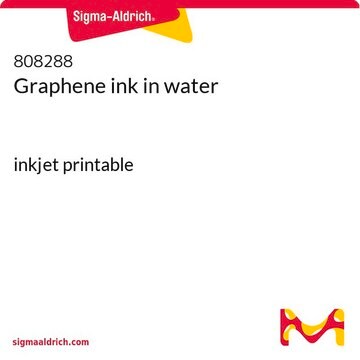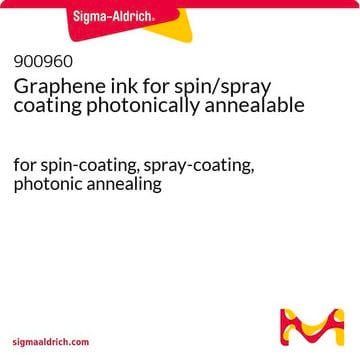901410
Hexagonal boron nitride ink
for inkjet printing
Sinónimos:
Hexagonal boron nitride dispersion, with ethyl cellulose in cyclohexanone and terpineol, hBN dispersion, hBN inkjet printable ink
About This Item
Productos recomendados
Quality Level
form
dispersion
composition
Solid content, 4.4-6.4%
greener alternative product characteristics
Design for Energy Efficiency
Learn more about the Principles of Green Chemistry.
sustainability
Greener Alternative Product
color
white
particle size
≤0.3 μm
surface tension
30-35 dyn/cm
viscosity
6-15 cP (shear viscosity at 1000 s-1, 25 °C)
bp
213-218 °C (Terpineol)
density
0.9-1.1 g/mL at 25 °C
greener alternative category
InChI
1S/BN/c1-2
InChI key
PZNSFCLAULLKQX-UHFFFAOYSA-N
¿Está buscando productos similares? Visita Guía de comparación de productos
General description
Application
Legal Information
signalword
Danger
Hazard Classifications
Acute Tox. 4 Dermal - Acute Tox. 4 Inhalation - Acute Tox. 4 Oral - Eye Dam. 1 - Flam. Liq. 3 - Skin Irrit. 2 - STOT SE 3
target_organs
Respiratory system
Storage Class
3 - Flammable liquids
wgk_germany
WGK 3
flash_point_f
115.7 °F
flash_point_c
46.5 °C
Certificados de análisis (COA)
Busque Certificados de análisis (COA) introduciendo el número de lote del producto. Los números de lote se encuentran en la etiqueta del producto después de las palabras «Lot» o «Batch»
¿Ya tiene este producto?
Encuentre la documentación para los productos que ha comprado recientemente en la Biblioteca de documentos.
Los clientes también vieron
Artículos
Recent advancements in paper-based sensing platforms offer cost-effective clinical diagnostics with microfluidic channels and colorimetric or electrochemical detection zones.
Carbon-based Sustainable Organic Electronics (SOE) limit the use of critical elements and biodegrade at their end-of-life. This review offers insight on how structural and energy disorder in these materials influence device performance and includes evaluations of various transport models and their limitations.
Review on 1D vdWHs: Discusses materials, synthesis, optoelectronic applications, challenges, and future perspectives for 1D vdWH-based devices.
Professors summarize recent 2D materials synthesis advancements and biosensing applications in various fields.
Nuestro equipo de científicos tiene experiencia en todas las áreas de investigación: Ciencias de la vida, Ciencia de los materiales, Síntesis química, Cromatografía, Analítica y muchas otras.
Póngase en contacto con el Servicio técnico










